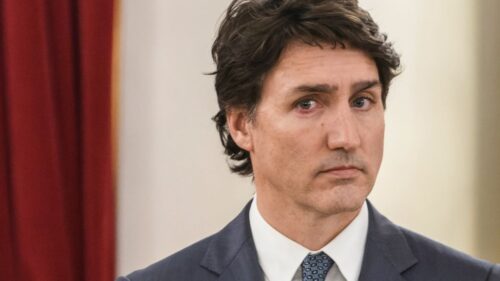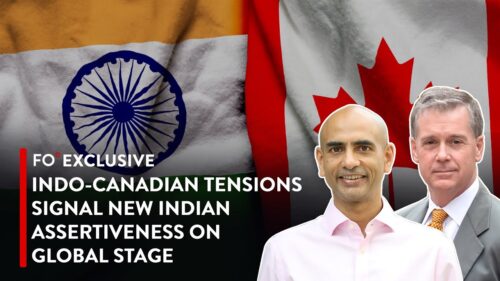Glenn Carle: I think we have to give at least two minutes to Canada, a country very dear to my heart.
Atul Singh: Yes, exactly. Let’s talk about Mark Carney Leading Liberals to a Fourth Consecutive Victory. That is huge. So let me paint what’s happened very quickly. Liberals won 169 out of 343 seats, they got 44% of the vote. The Conservatives won 144 seats, 41% of the vote. Pierre Poilievre, the Conservative leader, lost his own seat. Now, for our American viewers and listeners, remember that Canada has a parliamentary system modeled after Westminster in the UK. I have to explain it to a young American tomorrow — so, you don’t just get to be a presidential candidate. You’re the leader of a party, everyone fights their own parliamentary seat and the party that gets the most seats, or the candidate who can command majority support in Parliament, gets to be prime minister. It is somewhat important to get elected into Parliament, otherwise you can’t be the leader of the Parliament if you’re not even in Parliament. So, poor Pierre — a really bad day for him. What makes it worse is that this was a comeback victory. The Liberal Party has enjoyed a historic surge in polls since the start of the year. Under Mark Carney, a former Governor of the Bank of England, former governor of the Bank of Canada, Liberals have beaten the Conservative Party. So he can send a thank-you card to Donald Trump. Now, how did the fault lines break out? And remember, Mark only announced he was running on January 16, and he won all 343 electoral districts to become leader of the Liberal Party. During the leadership campaign, what did he do? He repudiated some of Justin Trudeau’s economic policies. He blamed Trudeau’s profligate spending for Canada’s vulnerability to American tariffs. He pitched himself as the best-placed candidate to negotiate with Donald Trump and deal with Canada’s perilous economic situation. The message, and obviously his impressive résumé, resonated with many voters.
Canada’s anti-Trump vote
Atul Singh: What did Pierre do? Pierre was against immigration and inflation, and he was promising some sort of Canada First—
Glenn Carle: But he was in favor of apple pie and motherhood.
Atul Singh: (Laughs) Yes, exactly. And, shall we say, he came unstuck. So more about Mark from Glenn, because both of us played ice hockey for Harvard. (Laughs)
Glenn Carle: That’s right. His chief qualification for any position is that he was a Harvard hockey player. But he’s a youth. He was ten years after I was there, so I’ve never met him, unfortunately. Well, this may be one of the positive — perhaps the one positive — thing that Donald Trump has achieved in his public life, is that he brought Mark Carney to the premiership of Canada. I think the vote, to the extent that it has significance in a larger sense — it’s certainly important for Canada — is that it’s an anti-Trump vote. The Conservatives and significant parts of the center of Canada — the inland of Canada, Alberta and Manitoba, and so on — are Trumpian in their political outlooks. And this election was a repudiation of that. It was not only anger at Trump and fear of his imperialistic, bombast rhetoric, and so on, but a rejection of the resonance that that has had within elements of Canadian society and politics. So that makes it significant for Canada, but also in a larger sense. Also, Canada is… well, there’s no other superpower-sized state other than the United States or China. The EU is a conglomeration, of course, a union. So Canada has as much influence as most any. I think in the ranking of economic size, it’s sixth or seventh or something like that, which makes it significant and plausible as a standard bearer for how to coalesce and respond to the threats to all of the norms and practices posed by Donald Trump. Now, what concretely that means remains to be seen, but he at least is, for the moment, the apparent champion of how to respond to Donald Trump.
Global response
Glenn Carle: Now, for the world, what does that imply? The issues in Canada are similar to those of France, Germany, England and other industrialized democracies. How do you address overregulation? This is the big argument always of conservatives. How do you address insufficiencies in defense spending? How do you develop a coherent foreign policy with allies that affirms these norms and yet somehow acts independently, if necessary — as it appears it will be — to the United States?
Atul Singh: And immigration.
Glenn Carle: Thank you. And the most important thing of all: All of this is a response. Carney’s election, all the turmoil in Europe politically, the rise of the far rights in nation after nation — fundamentally, is a reaction to, if not a response to, the issue of immigration and social change. That underlays and explains, really, what’s happened in the United States and in all of these other states. So his election shows perhaps a hope for a response, but has the similar underlying causes. Except poor Canada is stuck having this troublesome behemoth on its southern border, and so it’s obviously a response to that. How this will evolve is unknown, but Carney has as many qualifications as anyone — with the possible exception of political skills. But he’s done well for the last four months in that regard.
Carney–Sheinbaum collaboration?
Atul Singh: Canada potentially offers hope for the Liberals that all is not lost. It is a huge boost to Mexico as well. Remember that the US has two major trading partners — Canada and Mexico — one to the north, one to the south. It doesn’t have a Pakistan or China at its border, unlike India, so life is a lot easier. And now Claudia Sheinbaum — who’s in some ways Marxist, but is a canny politician and a tough negotiator — will almost inevitably team up with Mark Carney, who is a technocrat, who is an economist, who’s a savvy character who’s acquitted himself fairly well, actually, when he was heading the Bank of Canada. That was after the global financial recession, the global financial crisis. And then he headed the Bank of England during the Brexit years, at a time when the Bank of England got greater powers to oversee banks’ capital requirements. So he is a bit of a policy wonk, and it remains to be seen now how both Sheinbaum and Carney negotiate with their national… I wouldn’t say enemy, but national and ideological adversary. So hey ho, there we go: The die is cast.
Glenn Carle: Everyone should play hockey, and you’ll have national success.
Atul Singh: Exactly. On that note, we will see you next month. Thank you very much for watching this. Subscribe to our YouTube channel if you’re watching this on YouTube. And if you are reading the summary on our website, then make sure you sign up for our newsletter and follow us on social media if you’re on social media. And remember that should you want advice on political and geopolitical risk and the global economy, you have Glenn Carle, the senior partner of FOI, to turn to — and we will send you good stuff should you contact us. Bye for now.
Glenn Carle: Au revoir.
[Lee Thompson-Kolar edited this piece.]
The views expressed in this article/video are the author’s own and do not necessarily reflect Fair Observer’s editorial policy.











































Comment